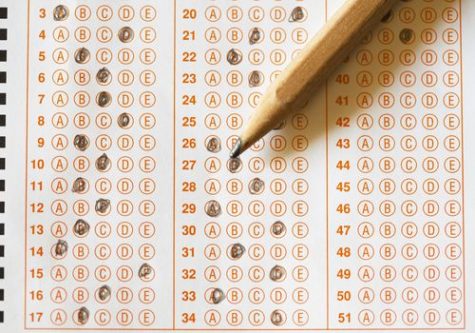Learning By Hurdles: Flaws Of Formative and Summative Grading
November 24, 2020

Formative and summative grading is a major obstacle to student goals and in a lot of cases is designed indirectly to promote failure.
At Lakes High School as well as the Clover Park School District, grading is generally formed on two main categories labeled formative and summative, with the exception of percentages of overall marks assigned to collaboration and participation among other categories established by teachers tailored to fit their classroom approach.
Teachers decide between the two categories, ratios in which quarter and semester grades are largely determined. Typically, the formative section is comprised of in-class assignments, homework, and other portions of curricular work. Summative grades include tests, essays, projects, and other components.
Tests, in particular, are most infamous for playing make or break during critical student reports. Students that undergo text anxiety or have not established with their teachers a legitimate and effective study routine, experience the backlash of tests directly through their grades: One day they have a solid A, and the next an F.
Drastic changes to marks in classes does not further encourage students to seek out help to resolve their issues. A stationary mindset is adopted, because the progress and grit applied to months of class work that seemingly propel students, is virtually dismissed by an inaccurate representation of their knowledge or ability to critically think.
During the end of either semester, it’s almost a conversational tradition to hear students dread and remain disgruntled about their finalized grades. Lack of motivation or work ethic is a genuine and natural struggle to be overcome by students throughout their time in school. But being met with a system inconsistent in demonstrating and giving credit where due to the resilience and valuable contributions students make to their class settings is something that must be discussed.
“Formative work accounts for a lot of time spent working outside of the classroom and is good prep for tests, but when the tests don’t reflect the work done in formative work, it makes it hard to keep grades up since formative work isn’t worth as much,” Grace Laubach, a senior at Lakes says.
Grace is a dedicated student who regularly participates and excels in class as well as stays involved with extracurricular activities. She states, “I appreciate classes that value formative work and are directly helpful to summative tests and grades.”
Similar to the fight against standardized testing within the college admissions process, tests-based grades penalize students who are not always met with simple living situations or schedules dedicated solely to school to foster study habits and proper preparation for tests. Some students from low-income communities experience other responsibilities outside of school, and are failed to be met with complete accommodation.
Instead, students of every walk of life deserve a fair balance of work and assessment within the school, while their abilities are credited and their potential is met where they are.
Especially in an online environment, the current grading policy inspires a falsified sense of normalcy among other aspects present, such as the overwhelming workload and disconnect between students and teachers. The school district should seriously consider the steps to dispelling formative–summative disproportions. A focus on classroom participation and discussion as well as daily work would prove beneficial to the success of its students.
In essence, the glorification of hard work within CPSD and Lakes does not meet its assigned value on report cards. Even during a pandemic, most students feel overwhelmed by an excess of assignments paired with the needed patience of sitting through four virtual hour-long classes. Without the demarcation provided by a school campus and homework to be done off of it, an uphill battle of testing is what is left for students to tackle.
Tests, though necessary to provide stakes and assessments of preparation, time management, and study habits of students involved, need to be considered holistically in association with rigorous efforts put forth.
As John Green put simply in this TED Talk, “I think the reason that I was such a terrible student is that I felt like education was just a series of hurdles that had been erected before me, and I had to jump over to achieve adulthood.”
Green’s choice of words calls for a difference in approach to the necessary difficulties in numerical assessments put out through Skyward and progress reports. Classroom dynamics need to cater to student growth and intellectualism and must be met with solutions to give better, if not more credit to the thinking and development transforming students into critical minds and speakers.